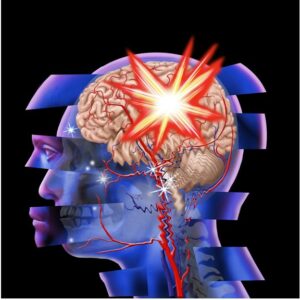Contact a traumatic brain injury lawyer for help in a crisis.
A traumatic brain injury lawyer works in a very specific area of personal injury law. Here, the lawyer’s focus is on representing people who have suffered a traumatic head injury. Such an injury can cause disability, cognitive dysfunction or death. Further, these injuries may be caused by an accident, sudden impact, or other events.
In this page, we will discuss what constitutes a traumatic brain injury, how to identify one, and how Kitay Law Offices can help you get compensation for your injury claim.
What is a traumatic brain injury?

Unfortunately, brain injuries are all too common in the United States. In fact, the Centers for Disease Control and Prevention (CDC) estimates that almost three million people sought treatment at the emergency room for head injuries as recently as 2014.
A TBI is considered “acute” if it occurs within minutes to hours of the initial trauma. Otherwise, it would be classified as chronic. Chronic injuries often last six months or more after the event, but can sometimes progress throughout life.
Traumatic brain injury causes
Traumatic brain injuries can result from a variety of causes. One of the most common causes of traumatic brain injury is motor vehicle accidents. Alarmingly, these account for more than two million deaths and injuries each year.
Another prevalent cause of TBIs can be attributed to falls from heights. This type of accident caused an estimated 222,000 head injury cases in the U.S., according to 2013 statistics compiled by the CDC. Other causes include assault (40% involve firearms), contact sports like football or hockey, motor vehicle crashes without seat belts or airbags, or even explosive blasts such as those seen in war zones or terrorist attacks.
Here is a list of some of the most common causes of traumatic brain injuries that we see every day:
- Car accidents
- Truck accidents
- Motorcycle accidents
- Bicycle accidents
- Pedestrian accidents
- Slip and fall accidents
- Defective products
- Medical malpractice
- Contact sports
- Assault
Can a traumatic brain injury lawyer help me get compensation for my injuries?

What types of compensation can a traumatic brain injury attorney get for me?
The law gives you the right to recover compensation for a number of reasons related to your brain injury. In the legal field, we call these “damages.” Here are some types of compensation, or damages, you may be able to receive:
Outstanding medical expenses
Most likely, you will have medical expenses that are going to continue coming in the near future. The cost of these treatments can be a huge financial burden for many families. But, it also may take you out of work while you’re dealing with your injury and recovery.
Lost wages
Many people suffer from brain injuries which cause them to miss time at work or lose their job all together. In either situation, this can create a large amount of lost income due to missing out on days at work. Further, you may completely stop earning money because you are no longer employed.
Pain & Suffering (including emotional distress)
Brain injuries may be quite painful. Often times, they will lead to emotional and mental pain which can be exacerbated by the physical pain. In addition, it is common for brain injury victims to suffer from depression or anxiety-related symptoms due to their injury.
Loss of enjoyment in life activities
It may also be difficult to enjoy many things that you used to find joy in before sustaining a TBI. This might include hobbies like reading books, socializing with friends, and participating in sports or recreational activities.
Costs to remodel your home
Sometimes, a head injury can be so bad that you cannot get back to your daily life in any sense. In these cases, your home may need to be remodeled or modified. In doing so, you are able to live in a safe and healthy space.
The cost of this work will vary depending on the severity of the injury. However, it can often range anywhere from $50,000-$150,000.
Future medical bills and costs
Especially with TBIs, treatment may be necessary on a long-term basis. When this happens, victims may need to be admitted into a rehab facility on a full-time basis. Even worse, these facilities often charge rates that are much higher than home or outpatient clinic care.
Also, just getting around can prove problematic due to damage done by the injury itself. Victims may rely on wheelchairs or electric scooters as mobility aids. Unfortunately, these devices can cost between $2000-$4000 each!
Are there different types of traumatic brain injuries?
Yes, there are many different types of traumatic brain injuries. Some of the most common traumatic brain injuries we see include:
Concussion
A concussion occurs when the brain is shaken and jars against the skull. This can happen when a person falls from a height, strikes their head on something after being thrown by an explosion or car accident, collapses in a seizure, or gets hit with another object such as a baseball bat.
Concussions may cause temporary loss of consciousness along with confusion and other symptoms. The symptoms are often mild but may include:
- Headache;
- Nausea/vomiting;
- Dizziness; or
- Blurry vision.
Contusion
A brain contusion is similar to a concussion, but will also typically cause bleeding underneath the skin. If the bleeding does not stop, the condition can become serious.
Symptoms of a brain contusion can include a severe headache, nausea/vomiting, confusion, and problems with memory or understanding speech. Other symptoms are often less common but may include double vision or blurred vision in one eye; paralysis of arms and legs on one side of the body (hemiplegia); numbness or tingling sensations on arm(s) or leg(s); unresponsiveness to stimuli such as sound; and involuntary shaking movements affecting the whole body (seizure).
Coup-contrecoup
Coup-contrecoup brain injuries are unique because the brain is not just hit once. Instead, the impact to one side of the head causes the brain to impact the other side of the skull. In other words, you suffer two distinct brain injuries.
Mild traumatic brain injury
Even though this term includes the word “mild,” a mild TBI can feel worse than the name implies. Common symptoms may include headaches or migraines, dizziness, a feeling of pressure in the head, nausea, vomiting and balance problems.
A more serious TBI may include:
- Loss of consciousness for any amount of time;
- Amnesia surrounding events before or after injury;
- Changes to speech patterns such as slurred words;
- Difficulty maintaining fluent conversation, and
- Others symptoms.
Diffuse axonal brain injury
Diffuse axonal brain injuries are some of the most serious. On a microscopic level, the axons in the brain tissue are damaged. These cells transmit messages between different parts of the body and maintain essential functions, like speech or breathing.
They also help control movement and feeling in areas around your eyes. Importantly, this helps to regulate involuntary movements such as blinking or swallowing.
A diffuse axonal injury can cause severe symptoms that may not be immediately apparent after an accident. Therefore, a follow-up evaluation by a doctor can be key to diagnosing the severity of your injury.
The damage from this type of brain injury is often irreversible, and so rehabilitation therapies may be required. There are many types of therapy that range in intensity and complexity. These may include physical therapy for movement difficulties or speech pathology for problems with communication.
Penetrating brain injury
When a foreign object impacts the skull with enough force, it can penetrate the skull and brain. This type of injury is typically life threatening, especially if severe bleeding or other bodily function problems develop.
If a foreign object penetrates your skull, you may need emergency surgery to save your life. The severity will depend on the size of the object and its position in the brain.
What are some common symptoms of a TBI?
Brain injuries can manifest themselves in a number of ways. However, there are some tell-tale signs that someone has suffered a TBI. A mild traumatic brain injury may not produce any noticeable symptoms. However, more serious injuries can lead to intense headaches and dizziness as well as nausea.
In many cases of head trauma, the victim loses consciousness for an unknown period of time before waking up again. However, it important to mention that not all head injuries result in a loss of consciousness. In fact, many people who have suffered a concussion will be awake and responsive.
Determining the severity of someone’s TBI is often difficult, as symptoms can take many days or weeks to appear. Fatigue, feeling spaced out or low energy level are all common in those that suffer from head trauma.
A general lack of interest in daily activities is another sign that may signal a more serious brain injury has occurred. It’s important for family members and friends to watch for changes like this. And if these symptoms occur, ensure you seek medical attention immediately.
How do doctors test for a TBI?
Diagnosing a traumatic brain injury can be difficult. Doctors will take a patient’s medical history, and may carry out MRI scans or CT scans. Each of these methods is meant to help diagnose whether you’ve suffered a traumatic brain injury.
Doctors are trained to spot many different indicators that can signal whether someone has sustained a TBI. These may include blood on the scalp, unequal size pupils, and changes in speech patterns.
It can be obvious to tell if someone has suffered from blunt force trauma (such as external blows). This may cause visible surface damage like bruising and bleeding under your skin. On the other hand, it’s more complicated to diagnose a TBI caused by whiplash.
Doctors may also utilize the Glasgow Coma Scale (GCS). This measures a person’s level of consciousness and helps to determine the severity of their injury. This can be done by asking patients questions such as who they are, what day it is or where they are.
Traumatic brain injury myths
Because brain injuries can be hard to diagnose, there is a lot of misinformation out there. Whether you have been injured or your loved one is suffering, read about these myths to help keep each other safe:
Myth: If you don’t lose consciousness, you don’t have a concussion.
You can suffer a concussion even if you do not lose consciousness. Importantly, some of the most severe concussions are not accompanied by loss of consciousness.
Myth: Rushing back to work will clear your head and make you feel better.
Immediately going back to your regular daily tasks, including work, can be dangerous. Instead, taking some time off of school or work can help allow your brain to recover fully. Make sure you speak with your doctor about the best course of action to take.
Myth: A negative MRI or CT scan means my brain is fine.
This misconception cannot be further from the truth. Instead, negative MRI or CT scans may simply indicate that the injury’s location cannot be detected with these tests.
Myth: Recovery from a TBI happens quickly.
If only this were true! Instead, recovering from a TBI can take a long time and is difficult. Recovery can be slowed down by complications like seizures or cognitive difficulties that are common with TBIs. These complications often require more extensive treatment plans.
Safely returning to work after a traumatic brain injury
For most of us, we still have obligations that we must meet even after sustaining a TBI. Even after taking time off to recover, you’ll most likely still need to get back to work in some capacity. Unfortunately, there are some common mistakes that people make when it comes to returning back to work after a TBI.
First, and most importantly, speak with your doctor about whether you should try returning to work. If you are given permission to return, here are some steps to ensure you can safely get back to work:
Speak with your employer
Whether or not you decide to go back to work, talk with your employer about your options. Maybe you can start slowly, work shorter hours, take more frequent breaks, or even transition to a different job within the company. And after returning to work, continue to monitor yourself and keep an open dialogue with your supervisors.
Explore occupational therapy options
Occupational therapy work includes aiding those with disabilities, helping the recovery process after injury, and providing supports for adults that are dealing with age-related changes. Your treating doctor may even have recommendations for a trusted occupational therapy provider in your area.
Consider vocational rehabilitation services
If you are having trouble returning back to work, vocational rehabilitation services may be a good option.
Vocational rehabilitation is designed to make it possible for people with disabilities or injuries to rejoin the workforce. This specialized assistance can include a number of services. Typically, these may include:
- Vocational assessments and evaluations;
- Training in general skills;
- Refresher courses;
- On-the-job training;
- Employment counseling; and
- Placement search.
Brain injury FAQs
Q: How long do I have to file a lawsuit for my traumatic brain injury?
In Pennsylvania, you typically have two years from the incident to either settle your case or put it into court. There can be some special circumstances where this period of time may be different. So, consult with an experienced traumatic brain injury lawyer.
Q: How much does it cost to hire a lawyer for my traumatic brain injury?
Usually, it will cost you nothing out of your pocket to hire a lawyer for your traumatic brain injury. Most lawyers in this field will work on your case without charging you by the hour.
Instead, your lawyer will receive a percentage of the recovery that he or she is able to obtain for you. As a result, you and your lawyer will always have the same interests. The more your lawyer can obtain for you the more your brain injury attorney will make.
Kitay Law Offices can help with your traumatic brain injury
If you, or a loved one, has suffered from a traumatic brain injury, contact us for help! We’ll work hard to help you obtain the maximum compensation available for your case. Contact us online or call 888-KITAYLAW for a free consultation today!

